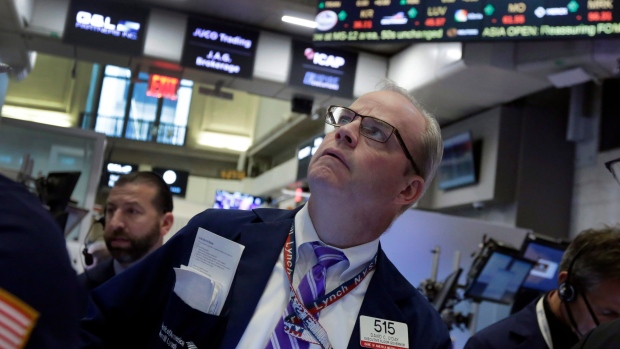Dec 19, 2017
Global stocks edge lower on tech as full U.S. tax plan vote looms
, Reuters

NEW YORK — Global stock markets edged lower on Tuesday, while U.S. Treasury yields rose, as Republican legislation with steep cuts to corporate taxes cleared the House of Representatives and headed towards a final vote in the Senate.
U.S. stocks hit successive highs ahead of the tax overhaul bill, but modest selling has crept into the market as most traders see the positive impact of the bill as already priced in.
"I really think it might be: buy the rumor, sell the news," said Jim Paulsen, chief investment strategist with the Leuthold Group in Minneapolis. "Wall Street has had long enough to vet this thing."
The Dow Jones Industrial Average fell 37.45 points, or 0.15 per cent, to end at 24,754.75, the S&P 500 lost 8.69 points, or 0.32 per cent, to 2,681.47 and the Nasdaq Composite dropped 30.91 points, or 0.44 per cent, to 6,963.85.
The pan-European FTSEurofirst 300 index lost 0.51 per cent and MSCI's gauge of stocks across the globe shed 0.30 per cent.
The U.S. House of Representatives approved the tax bill by a vote of 227-203. A Senate decision could come Tuesday night on what would be the biggest U.S. tax overhaul in more than 30 years. However, the U.S. Senate parliamentarian has ruled against three provision of the Republican tax bill, forcing the House of Representatives to hold a second vote on the legislation, Senator Bernie Sanders said.
President Donald Trump is expected to sign the bill into law by the end of the week if it is passed by the Senate.
The plan includes slashing the corporate tax rate to 21 per cent from 35 per cent, which analysts say would likely increase profits, buybacks and dividend payouts.
A slump in technology stocks, led by Apple Inc, also helped drag markets down in afternoon trading.
Apple shares fell more than 1 per cent after broker Instinet downgraded the stock to "neutral" from "buy" on doubts about iPhone X sales.
U.S. Treasury yields rose with the benchmark yield hitting a seven-week high as the tax bill pushed forward.
Before the House vote, bonds were selling in reaction to data that showed U.S. domestic home construction rose to a 13-month peak in November, with single-family home construction hitting a 10-year high.
Now, bond investors could be pulling back on expectations of economic growth, said Jack Ablin, chief investment officer with BMO Private Bank in Chicago. "Some may be concerned the boost on the fiscal side can be offset by monetary tightening," Ablin said.
Benchmark 10-year U.S. Treasury notes were last down 20/32 in price to yield 2.4644 per cent, from 2.392 per cent late Monday.
The 30-year bond was down 1-17/32 in price to yield 2.206 per cent, from 2.744 per cent.
The U.S. dollar, which slipped on tax plan doubts on Monday, began to flatten on the unexpectedly strong housing data.
In late trading, the dollar rose 0.3 per cent against the yen to 112.92 yen. It was little changed against the Swiss franc, but higher versus sterling as well as the Australian, Canadian and New Zealand dollars.
The dollar index, which fell 0.26 per cent, was weaker against the euro, which was up 0.5 per cent to US$1.1840.
Gold, which dipped as U.S. Treasury yields rose, is on track to post its narrowest trading range of any quarter in a decade in the last three months of the year.
Spot gold added 0.1 per cent to US$1,262.07 an ounce. U.S. gold futures fell 0.02 per cent to US$1,265.20.
Oil rose slightly, aided by an ongoing North Sea pipeline outage, supply cuts and expectations that U.S. crude inventories had fallen for a fifth week.
Brent crude was up 42 cents US or 0.66 per cent to US$63.83 a barrel. U.S. crude rose 47 cents US or 0.8 per cent to US$57.69.







